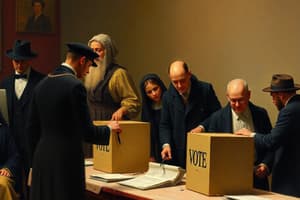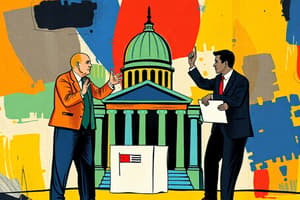Podcast
Questions and Answers
Which of the following scenarios best exemplifies a violation of democratic election principles?
Which of the following scenarios best exemplifies a violation of democratic election principles?
- A country's constitution outlines clear regulations for voter registration and candidate eligibility.
- Citizens freely exercise their right to vote for their preferred candidates without intimidation.
- A ruling party uses state resources to campaign, while opposition parties face restrictions in media access. (correct)
- An election commission operates independently to oversee and ensure the integrity of the voting process.
In a democratic system, what is the primary role of a constitution regarding elections?
In a democratic system, what is the primary role of a constitution regarding elections?
- To allow the ruling party to manipulate election rules for their advantage.
- To provide detailed procedures for every aspect of the election process, leaving no room for legislative interpretation.
- To establish the fundamental framework and principles upon which electoral laws and processes are built. (correct)
- To enable the executive branch to appoint election supervisors without legislative oversight.
Which question is LEAST relevant when evaluating the democratic nature of an election?
Which question is LEAST relevant when evaluating the democratic nature of an election?
- Who is responsible for overseeing the election process?
- Who is eligible to be a candidate in the election?
- What are the specific procedures for recounting votes in case of a dispute? (correct)
- Who is eligible to vote in the election?
Why are the rules and regulations governing elections typically codified in writing within a democratic framework?
Why are the rules and regulations governing elections typically codified in writing within a democratic framework?
A country holds regular elections, but the electoral commission is heavily influenced by the ruling party. Which aspect of democratic elections is most compromised in this scenario?
A country holds regular elections, but the electoral commission is heavily influenced by the ruling party. Which aspect of democratic elections is most compromised in this scenario?
In what fundamental way do elections contribute to the existence of a true democracy?
In what fundamental way do elections contribute to the existence of a true democracy?
Why are elections alone insufficient to guarantee a democratic system?
Why are elections alone insufficient to guarantee a democratic system?
Why might a non-democratic entity choose to hold elections?
Why might a non-democratic entity choose to hold elections?
What is a key difference between direct and indirect democracy?
What is a key difference between direct and indirect democracy?
Which characteristic of a nation would make direct democracy impractical?
Which characteristic of a nation would make direct democracy impractical?
How does indirect democracy leverage expertise to improve decision-making?
How does indirect democracy leverage expertise to improve decision-making?
What is the central tenet that defines democratic elections?
What is the central tenet that defines democratic elections?
What critical deficiency undermines the credibility of elections held in the absence of democracy?
What critical deficiency undermines the credibility of elections held in the absence of democracy?
Flashcards
Elections in a Democracy
Elections in a Democracy
Elections are the primary way people participate in a democracy.
Democracy Requires Elections
Democracy Requires Elections
A true democracy cannot exist without elections.
Democratic Elections
Democratic Elections
Elections must be fair with equal voting rights.
Elections and Democracy
Elections and Democracy
Signup and view all the flashcards
Direct Elections
Direct Elections
Signup and view all the flashcards
Indirect Elections
Indirect Elections
Signup and view all the flashcards
Limitations of Direct Democracy
Limitations of Direct Democracy
Signup and view all the flashcards
Advantages of Indirect Democracy
Advantages of Indirect Democracy
Signup and view all the flashcards
Universal Adult Suffrage
Universal Adult Suffrage
Signup and view all the flashcards
Multi-Party System
Multi-Party System
Signup and view all the flashcards
Role of a Constitution in Elections
Role of a Constitution in Elections
Signup and view all the flashcards
Representation of the People Act
Representation of the People Act
Signup and view all the flashcards
Free and Fair Elections
Free and Fair Elections
Signup and view all the flashcards
Study Notes
Elections and Democracy: An Intertwined Relationship
- Elections and democracy are connected.
- Understanding the correlation is important.
- Introspection allows for an appreciation of the relationship.
Can Democracy Exist Without Elections?
- Democracy is based on participation.
- Elections allow people to participate in democracy.
- Elections are a symbol of democracy.
- Democracy requires elections.
- Elections exemplify democracy.
Can Elections Exist Without Democracy?
- Elections do not guarantee democracy.
- Elections must be fair to be legitimate.
- Elections lacking democracy are not credible.
- Not all elections are democratic.
- Some countries use elections for appearances.
- Single-party systems are examples of non-democratic entities.
Direct vs. Indirect Elections
- Elections can be direct or indirect.
- Direct elections includes citizen involvement in decision-making.
- Direct democracy developed in ancient Greece.
- Gram Sabhas are examples of direct democracy.
Limitations of Direct Democracy
- Direct democracy is difficult in larger areas with a large population.
- Direct democracy is impractical with large populations.
- Citizens may lack the skills to take decisions in direct democracy.
- It is not possible to involve all citizens at once in direct democracy in a large country.
Advantages of Indirect Democracy
- Representatives are chosen by citizens in indirect democracy.
- Representation ensures better decision making from experts.
- Chosen representatives make decisions.
- Citizen involvement is not always practical.
Democratic vs. Non-Democratic Elections
- Democratic elections prioritize people's participation.
- Government by the People For the People is the objective.
- Universal adult suffrage is a democratic practice.
- Multi-party systems are examples of democratic practices.
- Non-democratic election practices go against people-centric governance.
- A lack of equal voting rights is a non-democratic practice.
- Limited candidate options are examples of non-democratic practice.
- Democratic systems are free and fair.
Ensuring Democratic Elections
- A constitution creates a democratic election.
- Rules and regulations need to be set out for a democratic election.
- India's constitution specifies how elections occur.
- The constitution is vital.
- The constitution enables specific processes of institutions for democratic elections.
- These processes can be direct or indirect.
- The constitution of a democratic country sets out the basic framework for elections.
- Details are given to the legislature, which enacts laws like The Representation of the People Act.
Basic Rules and Key Questions About Democratic Elections
- Who can vote?
- Who can contest elections?
- Who will supervise elections?
- How do voters choose their representatives?
- How are votes counted, and representatives elected?
- Eligibility to vote, contest, and fair supervision ensure elections are free and fair.
- Voter choice and vote counting ensure fair representation.
Studying That Suits You
Use AI to generate personalized quizzes and flashcards to suit your learning preferences.




